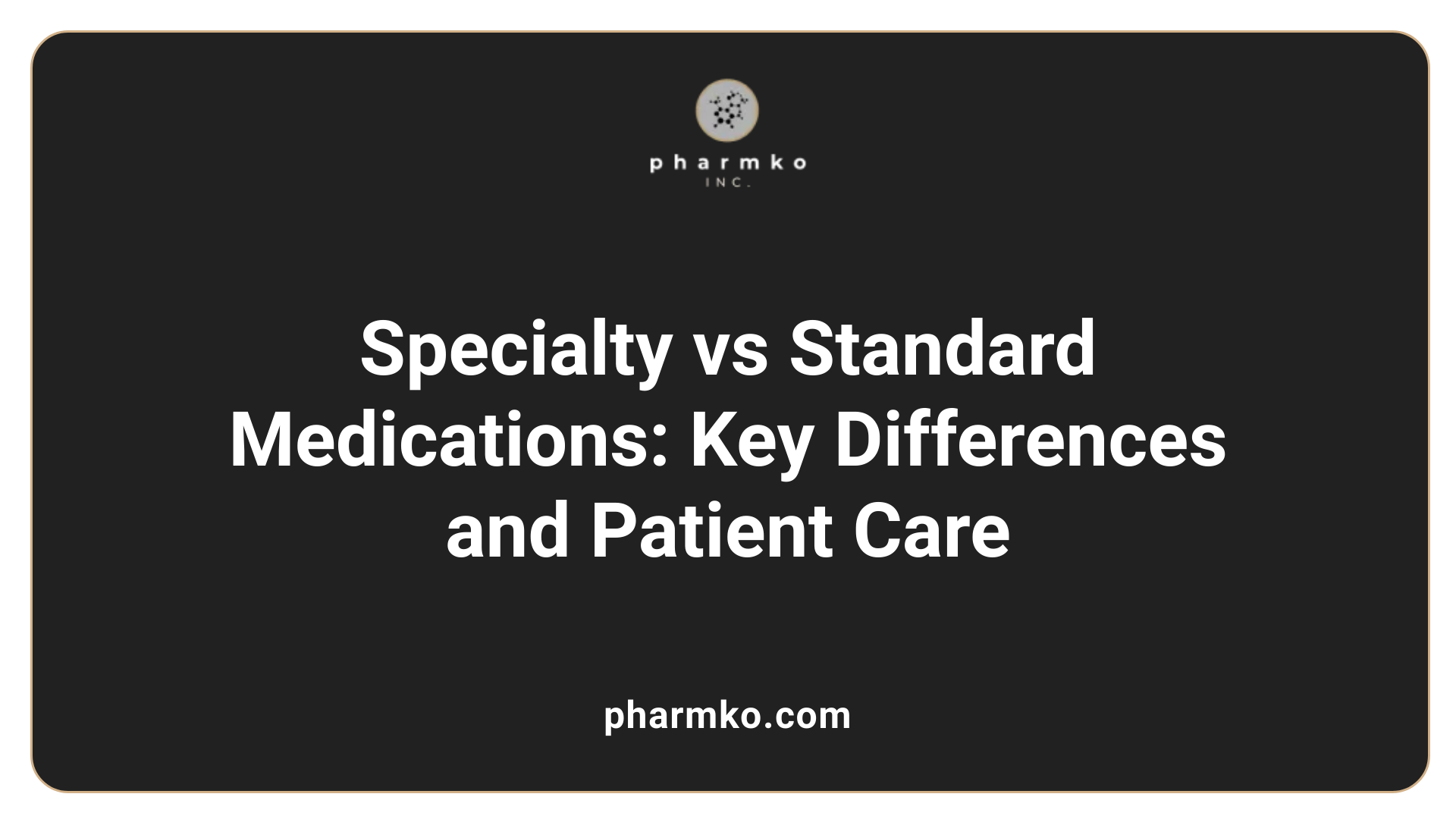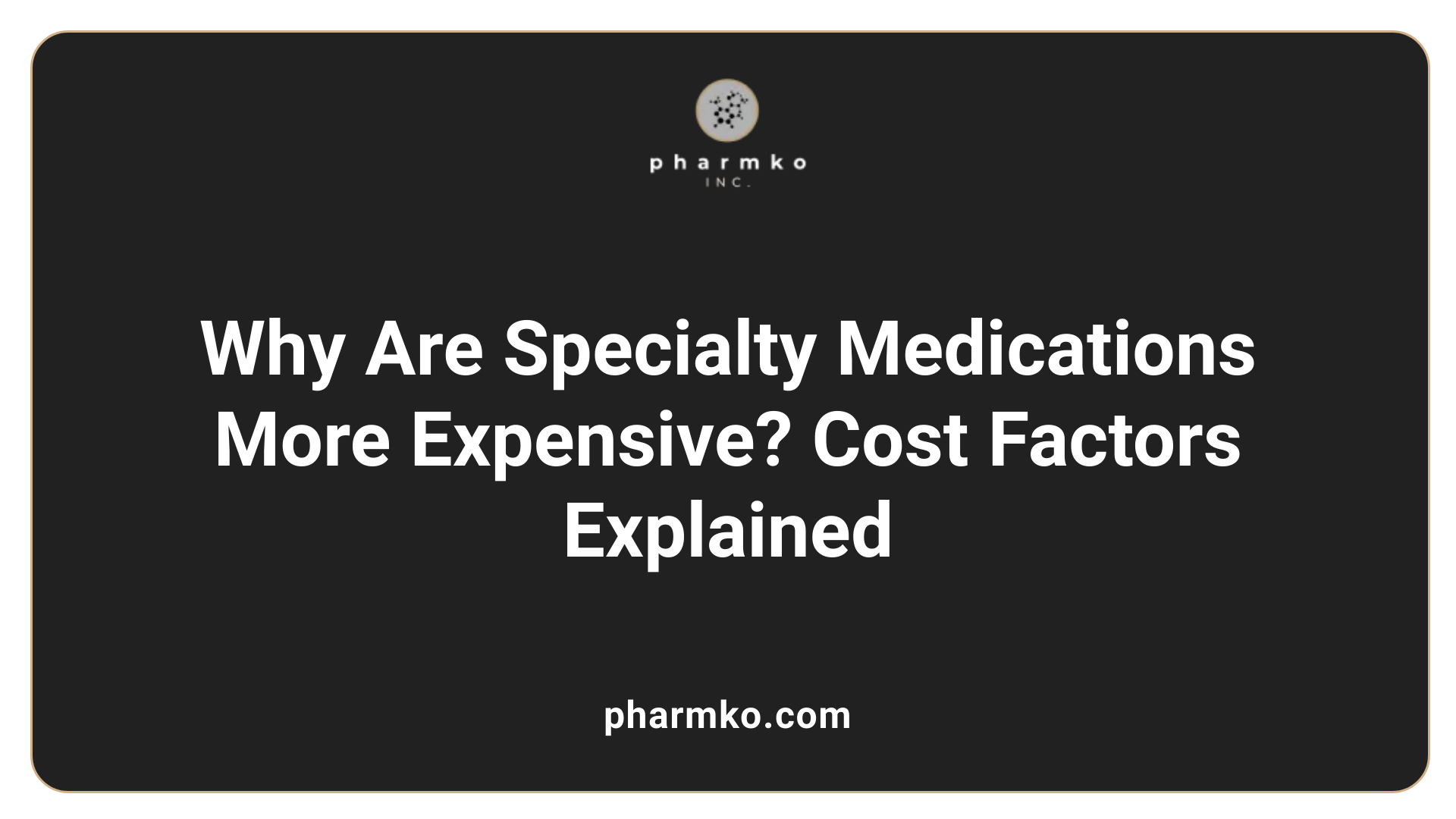Specialty meds for chronic conditions
Understanding Specialty Medications
As healthcare advances, the landscape of chronic condition management increasingly relies on specialty medications. These high-cost, complex drugs offer hope for those battling diseases like cancer, HIV, and rheumatoid arthritis but come with their own set of challenges. From intricate handling requirements to astronomical costs, understanding specialty medications is crucial for patients, caregivers, and healthcare providers alike. This article delves into what defines these medications, the conditions they treat, and how they differ from more traditional therapies.
Defining Specialty Medications

Characteristics of Specialty Medications
Specialty medications are defined by their high cost, complexity, and need for careful management. These drugs often cost over $1,000 per month and are usually used to treat chronic, rare, or complex conditions. Their administration may require specific handling and monitoring, typically involving injections or infusions rather than standard oral intake.
Additionally, specialty medications often necessitate extensive patient education and ongoing clinical support to ensure their effectiveness. This includes understanding potential side effects and drug interactions, which further emphasizes the importance of specialized care.
What Medications Are Considered Specialty Drugs?
Specialty drugs encompass a diverse array of treatments, including biologics derived from living organisms. They include therapies for conditions such as:
- Cancer : Utilizing targeted therapies and immunotherapy.
- Multiple Sclerosis : Using treatments like interferons and monoclonal antibodies.
- Rheumatoid Arthritis : Incorporating biologics that target the immune system.
- Chronic Inflammatory Diseases : Such as Crohn's disease, which may require medication to control symptoms and inflammation.
These medications are often subject to stringent insurance coverage protocols and may require coordination with specialty pharmacies to manage access and adherence effectively.
Key Differences Between Specialty and Standard Medications

How do specialty medications differ from standard medications?
Specialty medications differ from standard medications in several key aspects. They are typically designed for complex, chronic conditions such as cancer, rheumatoid arthritis, and multiple sclerosis. Unlike standard drugs, many specialty medications are biologic, which contributes significantly to their high cost. As a result, these medications often exceed $1,000 for a 30-day supply.
Additionally, specialty medications often require special handling and administration. This means they usually need to be dispensed through specialty pharmacies, which focus on personalized healthcare needs. These pharmacies provide a range of essential services such as:
- Managing complex conditions: Coordinating care to ensure effective treatment.
- Navigating insurance benefits: Assisting patients in understanding their coverage options.
- Home delivery options: Ensuring timely access to medications without burdensome trips to the pharmacy.
Patients using specialty pharmacies also benefit from:
- 24/7 access to knowledgeable pharmacists.
- Refill reminders to ensure continuity of care.
- Educational resources on medication usage and adherence for safe and effective treatment management.
This comprehensive support underscores the significant differences between specialty and standard medications in both administration and overall patient care.
Administration and handling of specialty medications
The administration of specialty medications often calls for specific protocols. These can include:
- Injectable and infusion methods, generally requiring supervision by healthcare professionals.
- Ongoing clinical monitoring to manage potential side effects and efficacy.
Only specially trained pharmacists and healthcare professionals typically handle these medications, ensuring they meet safety and effectiveness standards. This high level of touch and coordination enhances the treatment experience, making specialty medications a critical component in managing complex health conditions.
Conditions Treated with Specialty Medications
What conditions are treated with specialty medications?
Specialty medications play a crucial role in managing various complex and chronic diseases. Some of the primary conditions treated include:
- Cancer
- HIV/AIDS
- Multiple Sclerosis
- Rheumatoid Arthritis
- Crohn's Disease
- Hepatitis C
- Psoriasis
- Osteoporosis
These medications might treat rare conditions as well, such as Waldenstrom's macroglobulinemia and hemophilia .
Example treatments
Each condition may require specific treatments:
| Condition | Example Treatments | Description |
|---|---|---|
| Cancer | Chemotherapy agents | Medications that require administration guidance and side effect management. |
| HIV/AIDS | Antiretroviral Therapy (ART) | Significantly prolongs life when correctly administered. |
| Multiple Sclerosis | Interferons, monoclonal antibodies | Helps slow disease progression and manages symptoms. |
| Hepatitis C | Antiviral medications | Complex regimens needing careful coordination to avoid drug interactions. |
| Rheumatoid Arthritis | Disease-modifying antirheumatic drugs (DMARDs) | Requires monitoring for efficacy and side effects. |
| Crohn’s Disease | Biologics | Utilized to control inflammation and alleviate painful symptoms. |
Specialty medications, while accounting for only a small fraction of prescriptions, make up a significant portion of overall drug spending due to their intricacies and high costs. They often necessitate special handling and continuous monitoring to ensure effective treatment management.
Cost Factors of Specialty Medications

Why are specialty medications significantly more expensive than standard medications?
Specialty medications distinguish themselves from standard drugs due to several essential factors that significantly contribute to their higher costs. At the foremost, the complex manufacturing processes and biologic origins of many of these medications are responsible for their elevated price points. Often derived from living organisms, these drugs require specialized handling and administration methods, typically through injections or infusions.
Furthermore, despite being utilized by only a small segment of the population, specialty drugs constitute the majority of drug expenditures in the U.S. They have skyrocketed in approval rates—from just ten in 1990 to over 400 today—reflecting their advanced complexities and high development costs. Additionally, insurance plans may classify these medications into distinct payment tiers, necessitating a percentage of the cost paid by patients instead of a flat copay, which is common for standard medications.
Various elements contribute to the overall costs, including rigorous monitoring by healthcare providers and the inconsistencies in insurance coverage depending on administration types, which can lead to amplified financial burdens for patients.
Impact on healthcare costs
The financial implications of specialty medications on the healthcare system are profound. Specialty drugs account for approximately 60% of total drug spending while representing only about 3% of patients. The burden of high out-of-pocket costs may deter adherence to treatment protocols, leading to heightened health complications and expenses in the long run. As the market expands—projecting costs to comprise up to 50% of all drug spending within the next decade—the emphasis on cost-management strategies becomes increasingly crucial for both healthcare providers and patients.
Role of Specialty Pharmacies and Insurance

Services Provided by Specialty Pharmacies
Specialty pharmacies like Aurora Specialty Pharmacy play a crucial role in managing complex health conditions, including cancer, HIV, Crohn's disease, and multiple sclerosis. These pharmacies are specially designed to support patients with high-cost, specialty medications. They offer a variety of services that include:
- Medication counseling to help patients understand their treatments.
- Education on side effects and proper usage to enhance adherence.
- Coordination with healthcare providers to monitor dosages and potential drug interactions.
- Timely medication delivery to ensure patients receive their treatments promptly at home.
- 24-hour access to pharmacists to answer questions and provide support at any time.
Insurance Navigation for Specialty Meds
Navigating insurance for specialty medications can be overwhelming. Specialty pharmacies assist patients in understanding their benefits and filing claims effectively. Key aspects include:
Table of Insurance Navigation Aspects
| Aspect | Description | Importance |
|---|---|---|
| Coverage Types | Specialty medications are categorized under pharmacy benefits (for self-administered) and medical benefits (for provider-administered) | Understanding helps in minimizing costs |
| Cost Structures | Potential copays can vary significantly; members may face coinsurance or fixed copays | Influences treatment adherence and financial planning |
| Assistance Programs | Patient assistance programs help those without insurance access necessary treatments | Reduces financial burdens on patients |
Overall, specialty pharmacies serve as essential partners for patients, helping them navigate both complex treatment regimens and the financial landscape of specialty drug coverage.
Preparing for Specialty Medication Management
As the domain of specialty medications continues to expand, understanding their implications on health management becomes vital for patients facing chronic or complex conditions. With substantial financial considerations and the need for specialized handling, patients must not only find appropriate treatments but also navigate a complex array of healthcare services. Knowledge, careful planning, and collaboration with healthcare providers and specialty pharmacies are essential to maximizing the benefits of these medications while mitigating their challenges.
References
- Specialty Pharmacy for Chronic Conditions - Aurora Health Care
- Specialty Pharmacy for Chronic Conditions - Advocate Health Care
- [PDF] Specialty Pharmacy Drug List - Prime Therapeutics
- Understanding Specialty Medications - - Abarca Health
- [PDF] SPECIALTY DRUGS 101:
- Comparison of Specialty Medication Use for Common Chronic ...
- What are Specialty Drugs | CarelonRx
- Cut the confusion on specialty drugs | Wellmark Blue













